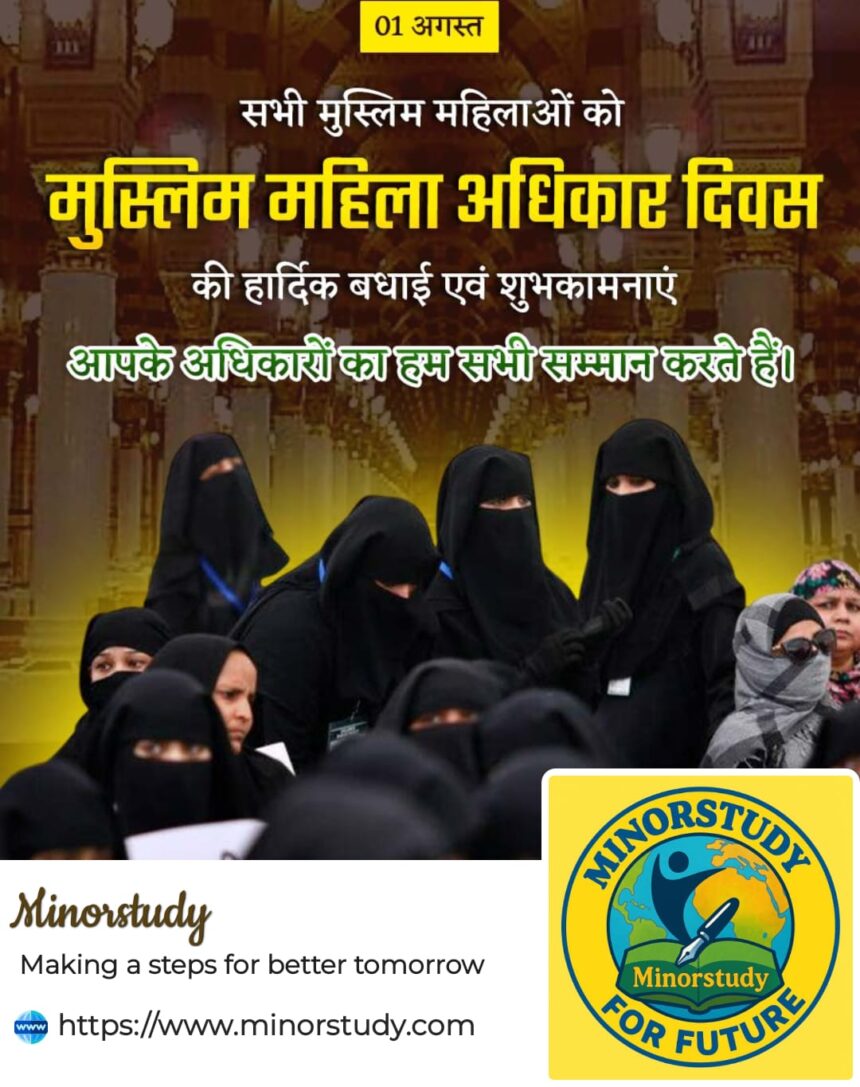🕌 Introduction: Celebrating the Voice of Empowerment
Muslim Women Rights Day, observed annually on August 1, marks a significant milestone in India’s journey toward gender justice, legal reform, and social dignity. It commemorates the abolition of instant Triple Talaq (Talaq-e-Biddat), a practice that had long jeopardized the rights and security of Muslim women.
- 🕌 Introduction: Celebrating the Voice of Empowerment
- 📜 History of Muslim Women Rights Day
- 📆 Timeline
- 📊 7 Empowering Facts about Muslim Women Rights
- 🔎 Significance of Muslim Women Rights Day
- 🎉 Observance and Awareness Activities
- 💬 Quotes & Wishes
- ❓ Frequently Asked Questions (FAQs)
- Q1: What is Muslim Women Rights Day?
- Q2: Is Triple Talaq completely banned in India?
- Q3: Can Muslim men still divorce their wives?
- Q4: Does the law support reconciliation?
- Q5: What role do NGOs play in this?
- 🧩 Important Points to Remember
- 💡 Daily Life Impacts
- 🏁 Conclusion: From Silence to Strength
This observance is not just a calendar event; it is a symbol of empowerment, hope, and constitutional equality. In a culturally diverse nation like India, ensuring dignity and equal rights for all—especially minority women—is a giant leap toward inclusive progress.
📜 History of Muslim Women Rights Day
🔹 The Triple Talaq Practice
Triple Talaq allowed a Muslim man to instantly divorce his wife by uttering “talaq” thrice—often over phone calls, text messages, or even social media. This arbitrary practice left countless Muslim women vulnerable, often without recourse or support.
🔹 Legal and Social Movements
2016: The issue gained national prominence when Shayara Bano, a Muslim woman from Uttarakhand, filed a PIL in the Supreme Court against Triple Talaq, citing constitutional violations.
2017: The Supreme Court, in a landmark judgment, declared instant Triple Talaq unconstitutional by a 3:2 majority.
2019: The Muslim Women (Protection of Rights on Marriage) Act was passed, criminalizing instant Triple Talaq and making it a cognizable offence.
🔹 2020 Onward
To honor this landmark reform, August 1—the date when the law came into force—was declared Muslim Women Rights Day by the Government of India.
📆 Timeline
| Year | Event |
|---|---|
| 2016 | Shayara Bano files PIL |
| 2017 | Supreme Court declares instant Triple Talaq unconstitutional |
| 2019 | Triple Talaq Bill becomes law |
| 2020 | August 1 declared as Muslim Women Rights Day |
| 2021–2025 | Observed with awareness drives, seminars & women empowerment campaigns |
📊 7 Empowering Facts about Muslim Women Rights
Instant Triple Talaq is now a punishable offence with up to 3 years of imprisonment.
Over 80% of Indian Muslim women supported the abolition of Triple Talaq (survey data).
India became one of the few Muslim-majority population countries to legally ban instant Triple Talaq.
Muslim women are now entitled to maintenance and custody rights post-divorce under the new law.
The law is gender-just—it ensures that women’s voices matter in personal and civil life.
It promotes constitutional equality under Article 14 and 21 of the Indian Constitution.
Triple Talaq continues to be banned in over 20 Islamic countries including Egypt, UAE, and Pakistan.
🔎 Significance of Muslim Women Rights Day
Legal Empowerment: Ensures Muslim women are protected under the law.
Gender Equality: Upholds constitutional values of equality and non-discrimination.
Social Justice: Ends the silent suffering of many women left destitute without any legal aid.
Minority Empowerment: Strengthens India’s secular and pluralistic fabric.
Increased Awareness: Encourages Muslim women to claim their rights and challenge injustice.
🎉 Observance and Awareness Activities
Muslim Women Rights Day is observed across India with various programs and campaigns:
| Activity Type | Description |
|---|---|
| 📚 Legal Literacy Drives | Educating Muslim women about their rights under the new law |
| 🧕 Women Empowerment Camps | Skill-building and livelihood training |
| 🏛️ Public Forums | Debates and lectures in universities and law institutions |
| 📺 Media Campaigns | TV, radio, and social media awareness |
| 🏫 School Outreach | Gender justice education for youth |
| 🤝 NGO Participation | Collaborations with women’s rights organizations and religious scholars |
💬 Quotes & Wishes
🕊️ “On Muslim Women Rights Day, let’s stand together for dignity, equality, and justice.”
🌸 “Empowerment begins when fear ends. Salute to every woman who raised her voice.”
🕌 “Today, the law protects her. Tomorrow, she will lead the change.”
❓ Frequently Asked Questions (FAQs)
Q1: What is Muslim Women Rights Day?
It is observed on August 1 every year to commemorate the abolition of instant Triple Talaq and promote the rights of Muslim women.
Q2: Is Triple Talaq completely banned in India?
Yes. Instant Triple Talaq is banned and considered illegal and void. It is also a punishable offence under the 2019 Act.
Q3: Can Muslim men still divorce their wives?
Yes, but only through the legal process defined by the Muslim Personal Law (Shariat) and as per judicial guidelines.
Q4: Does the law support reconciliation?
Yes. The law encourages reconciliation and family counseling, and does not promote imprisonment as a first step.
Q5: What role do NGOs play in this?
NGOs provide legal aid, emotional support, and help in rehabilitating women who were previously victims of Triple Talaq.
🧩 Important Points to Remember
Muslim Women Rights Day is a victory of constitutional justice.
The practice of instant Triple Talaq was not Quranic, but a socio-cultural distortion.
This is not against any religion—it is for the dignity and rights of women.
The law upholds the spirit of inclusive governance and equality.
Empowering women strengthens families, communities, and the nation.
💡 Daily Life Impacts
🧕 On Muslim Women:
More security and confidence in marriages.
Reduced fear of arbitrary divorce.
Access to legal recourse and maintenance.
👨👩👧👦 On Families:
Encourages family counseling and dispute resolution.
Protects children from broken homes and instability.
⚖️ On Society:
Builds awareness about gender rights and secular legal reform.
Challenges regressive practices and promotes progressive interpretations of religion.
🏁 Conclusion: From Silence to Strength
Muslim Women Rights Day is not just a date on the calendar. It is a reminder of India’s evolving democracy, where every woman—regardless of religion—has the right to live with dignity and equality.
It’s a day to celebrate courageous women, progressive lawmaking, and a justice system that listens.
🌟 “Her voice was once silenced by ‘talaq, talaq, talaq’ — today, it echoes across the nation as a call for equality.”
Let’s pledge this Muslim Women Rights Day to:
Educate, Empower, and Uplift
Stand with Women, Stand for Justice








